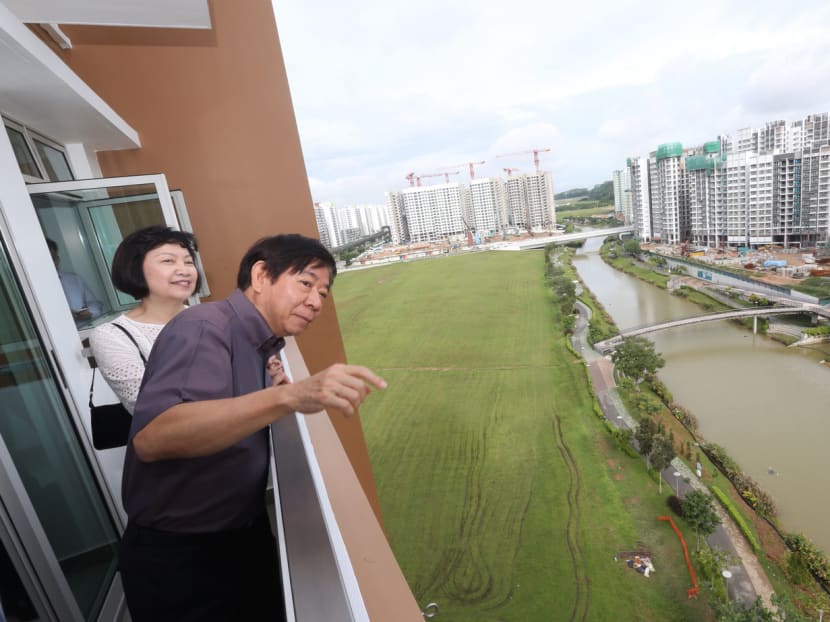Gentle fall in HDB resale prices a good thing: Khaw
SINGAPORE — A continued decline in the prices of Housing and Development Board (HDB) resale flats next year — albeit a gentle one — would be a positive development, said National Development Minister Khaw Boon Wan yesterday.

Dr Cheong Koon Hean, CEO HDB, showing the development of Punggol Waterway to Minister Khaw Boon Wan after the handover ceremony of Waterway Woodcress @ Punggol on 29 Dec 2014. Photo: Ernest Chua.
SINGAPORE — A continued decline in the prices of Housing and Development Board (HDB) resale flats next year — albeit a gentle one — would be a positive development, said National Development Minister Khaw Boon Wan yesterday.
Speaking after the handover ceremony for a completed block at the Waterway Woodcress Build-to-Order project, Mr Khaw said: “If what we observe this year continues into next year, I would consider that a very good development.”
Based on data released by Singapore Real Estate Exchange earlier this month, HDB resale flat prices have fallen by 9.8 per cent since their peak in April last year. Last month, prices dipped 0.8 per cent from October to hit a 40-month low, the index showed.
Asked what would be a meaningful price correction before cooling measures could be rolled back, Mr Khaw said he was in favour of a single-digit decline, which would prevent “heartache” for buyers. “I buy something and my neighbour (gets) it two months later at S$200,000 less — you’ll feel very ‘sayang’ (a sense of loss),” he said.
In a blog post yesterday, Mr Khaw also noted that the housing market was shifting from a seller’s market to a buyer’s one. “The shift is not yet complete and 2015 should see greater stability,” he said.
While there was room to adjust the temporary cooling measures when the time is right, measures that encourage financial prudence — such as the Total Debt Servicing Ratio (TDSR) — are here to stay. “In other words, don’t overstretch yourself. Spend within your means,” he told reporters. The TDSR was introduced last year to limit the size of a home loan a person can get based on their outstanding debts.
As for private property developers — which have been urging the Government to relax property curbs — Mr Khaw, when asked about options for those whose Qualifying Certificate (QC) deadlines are approaching, said they should price their units properly. “I’m sure if they price it properly, there will be takers,” he said.
Under QC rules, developers are required to sell all units in a development within two years of its completion or pay a fee for an extension.
While the HDB is easing back on the number of new flats launched and flat completions next year — to 16,900 and 26,000 respectively — Mr Khaw assured that the needs of flat buyers such as singles and those unable to purchase flats of their own are not being ignored. “If policies can be tweaked to facilitate their needs to be met, I will do so,” he said. He also hopes to help HDB residents who want to live near their parents, and vice versa. “I’ll do my very best to build three-generation flats.”
Asked if the ongoing review of the Central Provident Fund (CPF) system would affect home ownership, Mr Khaw said the CPF is a major platform that helps Singaporeans buy their own homes. “A big part (of one’s CPF savings) will always go into housing, but ... it’s not necessary for an entire chunk of it to go into housing. So (the) important thing is … plan,” he said.
As for the government study on reverse mortgages — as a means for elderly Singaporeans to retire comfortably — Mr Khaw said he was “not pinning too much hope on it”. He said several cities where reverse mortgages are fairly well-established had been examined. “The assessment is not very good in the sense that ... the take-up rate is … extremely low.”
In 2006, NTUC Income offered reverse mortgages to elderly Singaporeans, but scrapped them because of poor demand.








